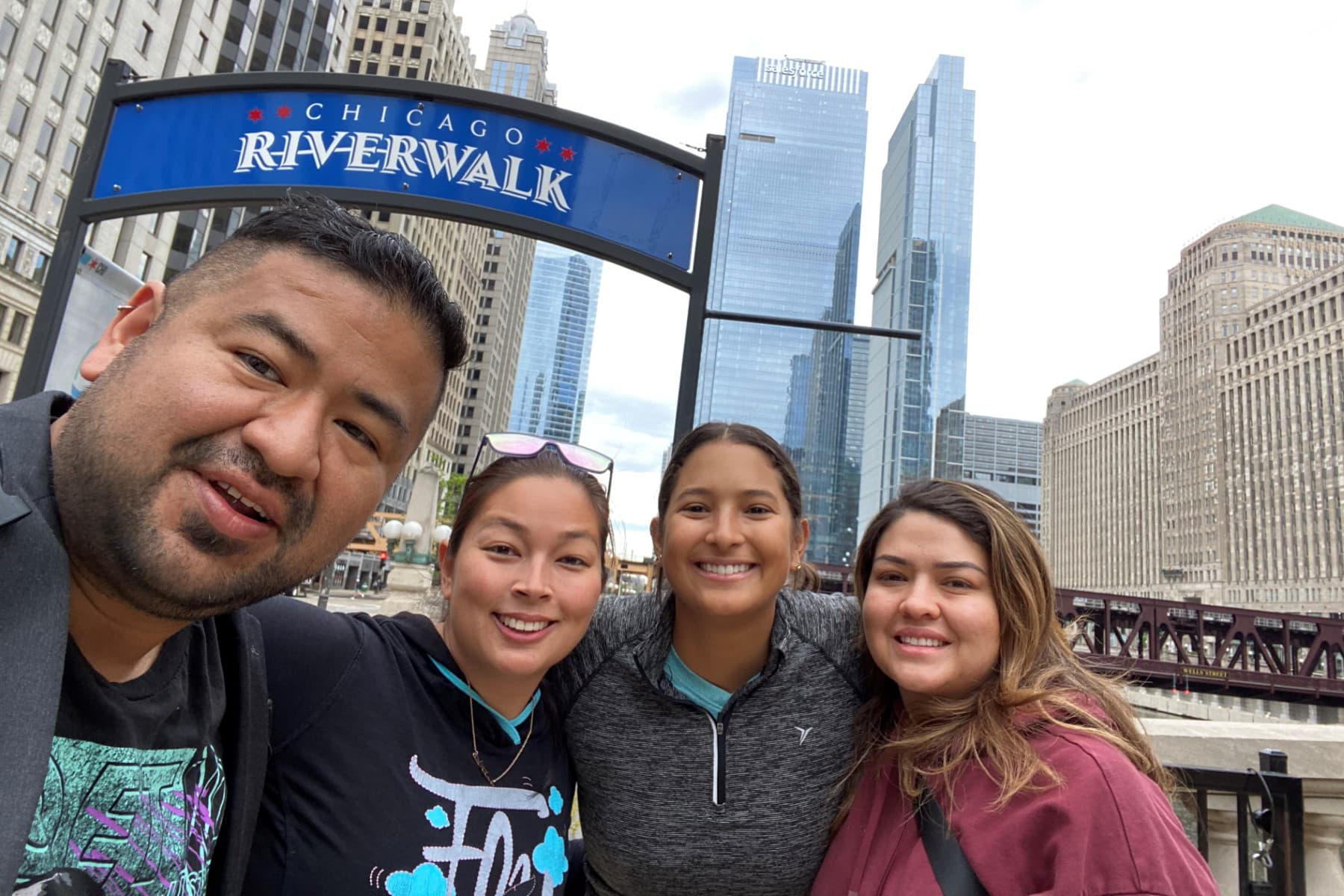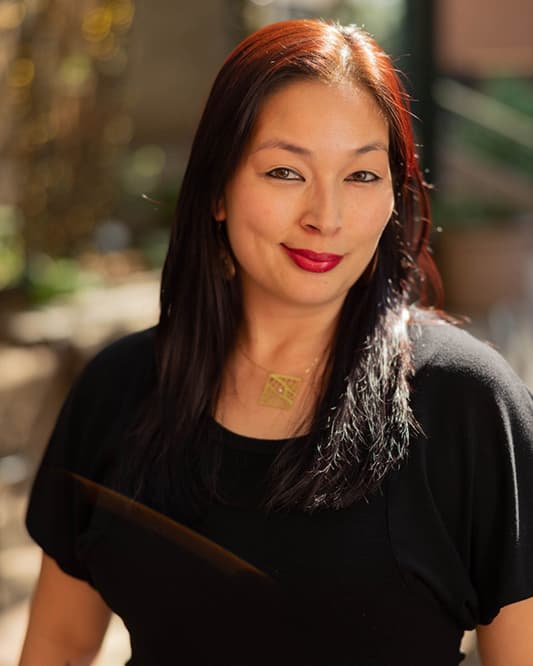Building Diverse College Communities
Dr. Robin Brandehoff’s Passion for Mentoring First Generation Students of Color is Uplifting
Julia Cummings | School of Education and Human Development Dec 1, 2023
Stemming from Hawai’i and East Los Angeles, Robin Brandehoff (PhD ‘20), assistant professor of educational foundations in CU Denver’s School of Education & Human Development (SEHD) and alum of SEHD’s PhD program, is “first-gen proud” and an excellent mentor to her CU Denver undergraduate, master’s, and doctoral students.
A pivotal moment in her scholarly development occurred during her final months in high school when a neighborhood shot caller with “full-on tattoos” informally sat her down on his porch steps and said, "Mi hija, you are the inspiration. You are the hope of this neighborhood. I want my two little girls to look up to you one day. You're going to college."
“When this guy tells you you're going to do something, you kind of listen,” said Brandehoff. “And, when he told me that, he just got up and he walked back into his house. That was the end of the conversation. I sat on his steps at least another 20 minutes just thinking, ‘Wow, no one told me that I'm going to go to college.’ His words really spoke to me. I went to a high-achieving high school where it was understood that most students were going to college. I knew that my honors grades and advanced placement classes were positive steps. I had the opportunity to go to college and all my friends were planning to go to college. But again, I just did not really think about it. Later that night, I jumped on a computer and started applying to colleges.”
 Brandehoff had a successful career as an English teacher and administrator in several urban and rural California schools and earned principal and administrative licensure prior to joining SEHD’s PhD program as a student in 2016. “One of the things that I learned was, I could only get so far in helping my students and helping out my community without earning the extra letters behind my last name,” she said. The SEHD faculty enjoyed her so much, they hired her as a peer upon completion of her PhD in 2020.
Brandehoff had a successful career as an English teacher and administrator in several urban and rural California schools and earned principal and administrative licensure prior to joining SEHD’s PhD program as a student in 2016. “One of the things that I learned was, I could only get so far in helping my students and helping out my community without earning the extra letters behind my last name,” she said. The SEHD faculty enjoyed her so much, they hired her as a peer upon completion of her PhD in 2020.
Today, most of Brandehoff’s qualitative research centers on the snowball effect of diverse types of informal mentoring experiences, and she tries to replicate these positive interactions as often as possible for her mentees. Her research projects include a study in collaboration with INPEACE in Hawai’i, on the island of O’ahu, about the research framework she developed called Hānai Pedagogy, the Grow Your Own Collective, and Pedagogy and Theatre of the Oppressed. She is also helping to launch a new concentration in SEHD’s Doctor of Education in Leadership for Education Equity (EdD) program called Justice, Equity and Diverse Identities. Applications for the next cohort are due January 1.
“Often, informal mentoring moments are just as important as formal mentoring moments,” said Brandehoff. “In formal mentoring meetings, students and I sit down to plan out assignments, dissertation proposals, and so forth. Those are all important strategic moves of what happens within a faculty advisor and advisee relationship. But there are so many other informal moments between a faculty mentor and a mentee that occur, that are just as pivotal.”
Nearly half of students at CU Denver are first-generation. At our graduation ceremonies, you’ll see the multi-colored first-generation graduation stoles signifying a major education turning point in a family’s history. These are a great symbol of pride. First-generation students often come from lower-income, non-white, and veteran households.
Making a community
First-generation students often miss a sense of belonging and “family” in their college experiences. Brandehoff can sympathize. She missed seeing teaching role models who looked like her during her high school and undergraduate years. In 2021, Brandehoff made a push to identify and support CU Denver first generation students of color by becoming the main faculty advisor for a SEHD program called Doctoral Students of Color. This group helps students figure out the unwritten rules of higher education. Doctoral students from other CU Denver schools are welcome to join. The group provides on-going programming, community, networking, inspiration, and advice to keep students persisting toward their graduation goals.

A newer opportunity in the group provides future researchers with travel funds to present their scholarly work at conferences like the American Education and Research Association (AERA). Last April, students in the group’s research team inspired other educators at AERA in Chicago with Brandehoff at their side. Their talk centered on the importance of mentorship, specifically mentorship through faculty mentors of color. They even took advantage of an informal mentoring walk/jog along the river while in Chicago. Because of Brandehoff’s unwavering sense of inclusivity in her leadership style, components of this presentation are being turned into a book chapter published in the end of 2023. There is a recurring scholarship component to this research travel experience that requires ongoing support from everyday donors. Donors need to specify that they want their donations to go to SEHD’s Doctoral Students of Color during the donation process.
.jpg?sfvrsn=58551fbb_1)
Valerie Richmond, a first-gen student in her last year in the School of Education & Human Development, is a proud member of the Doctoral Students of Color group and a member of the Leadership for Educational Equity EdD program. She has been profoundly impacted by Brandehoff’s teaching and mentorship since 2021. “Her passion definitely came out right away,” said Richmond. “And she builds these wonderful trusting relationships with her students, coming from a place of understanding and love. She allowed us as students to bring in our cultural identities, to bring in our indigenous language, to bring in what we knew as important resources of information and expertise that allowed us to thrive and that may not necessarily be part of traditional forms of teaching or thinking. And she centered those. She centered non-dominant ways of thinking and doing in the classroom, which is an approach that many of us hadn't experienced before as educators or students. I would say that conversations in Dr. B's classes are always buzzing and very intriguing. They bring out a lot of emotions and a lot of perspectives because she really promotes critical thinking, deep thinking within each student regarding the challenges of our histories, bias, and discrimination against marginalized groups.”
Brandehoff begins most of her emails to colleagues and students with “Aloha kākou!” She is determined to build a sense of “familial love” and comfort that you often see in classrooms in Hawai’i, but that you do not necessarily see on the mainland. “Being a first-gen faculty member is a point of connection for me and my students and I mention it off the bat,” she said. “At CU Denver, we have a wide variety of students, incredibly diverse, incredible stories, incredible experiences. They are amazing. And I am honored to work with and learn from them.”